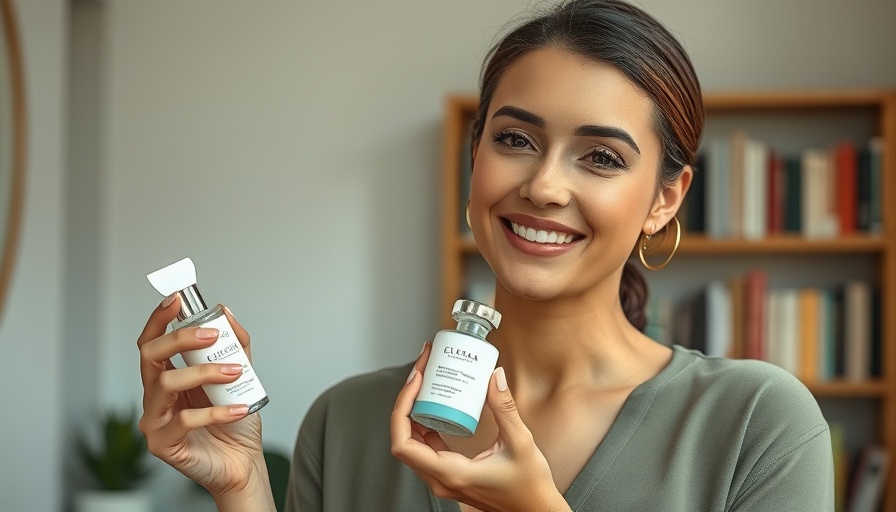
Is Your Child’s Summer Skincare Routine Up to Par?
As summer rolls in, many parents find themselves wondering if they are doing enough to protect their children’s skin. Dr. Luke Johnson, a pediatric dermatologist from the University of Utah, recently addressed several common concerns parents share, such as the safety and effectiveness of various sunscreens, how to manage eczema, and the best methods to prevent and treat insect bites. These topics are not just seasonal concerns; they are essential to ensuring long-term skin health for your children.
In 'Why Your Kid's Skin is Not Improving', the discussion dives into crucial skincare topics for children during summer, prompting us to explore effective solutions and expert insights.
The Sunscreen Dilemma: Chemical vs. Mineral
One of the biggest questions parents have is about the safety of sunscreen for kids. Concerns arose when a 2019 FDA study indicated that chemical sunscreen ingredients could be absorbed through the skin into the bloodstream. However, Dr. Johnson reassures that these findings showed no harmful effects. Nonetheless, he recommends using mineral-based sunscreens—those containing zinc oxide or titanium dioxide—over chemical-based options since they act like physical barriers, reflecting the sun's rays instead of absorbing them.
Sun-Protective Clothing: A Must-Have This Summer
In addition to sunscreen, parents should consider sun-protective clothing. These garments are designed to block ultraviolet light and often come with a UPF (Ultraviolet Protection Factor) rating. Not only do they offer a more reliable form of protection than sunscreen alone, but they are also typically made from lightweight material that’s more comfortable for kids, even in hot weather. Dr. Johnson emphasizes, “Don’t just rely on sunscreen; proper clothing keeps your kids safe while allowing for fun in the sun.”
Eczema: Understanding and Managing the Condition
Another pressing issue for many parents is managing their child's eczema. It can be distressing to see your child in discomfort, and while some may consider restrictive diets as a solution, Dr. Johnson strongly advises against it. According to him, eczema is primarily a skin issue, rather than a direct result of food allergies. Instead of focusing on eliminating certain foods, parents are encouraged to consult a dermatologist who can offer effective treatments. Moisturizers such as petroleum jelly are crucial, as they help restore the skin's barrier function.
Featured Advice: The Soak and Smear Technique
Dr. Johnson provides what’s known as the “soak and smear technique” for managing eczema, which involves soaking the skin in a bath for at least 10 minutes to hydrate it, followed immediately by applying a thick layer of moisturizer to prevent moisture loss. This method has proven especially effective for children with dry or sensitive skin.
Preventing and Treating Bug Bites: Safe Practices
With summer comes bugs, and that usually means insect bites. Dr. Johnson recommends using DEET-based insect repellent, noting its effectiveness and safety for children. However, he also suggests preventive measures like wearing appropriate clothing and keeping kids indoors during peak hours. If bugs do bite, parents shouldn’t hesitate to use topical steroids or over-the-counter hydrocortisone to alleviate itching and discomfort.
Common Myths in Pediatric Skincare: Debunking Misconceptions
Many misconceptions surround children's skincare, and Dr. Johnson passionately advocates for evidence-based practices. For instance, he dispels the myth that all skin wounds should be left uncovered to heal. Instead, the use of petroleum jelly on cuts, scrapes, and minor injuries can aid the healing process by providing a moist environment conducive to skin regeneration while protecting against bacteria.
The Benefits of Simplifying Skincare Routines
As engaging as multi-step skincare routines can be—especially given the rise of viral videos showcasing elaborate techniques—Dr. Johnson emphasizes the importance of simplicity. For both children and adults, less is often more. A straightforward routine of a gentle cleanser, good moisturizer, and sunscreen suffices for most cases.
Key Takeaways for Parents This Summer
- Choose Mineral Sunscreens: Opt for mineral-based sunscreens for the safest sun protection.
- Enhance Protection with Clothing: Equip your children with sun-protective clothing in addition to sunscreen.
- Focus on Moisturizing: Don't shy away from using petroleum jelly or similar products for eczema and other minor skin issues.
As summer unfolds, being proactive about children's skincare can ensure they enjoy their summer adventures without skin discomfort. Protecting your child’s skin isn’t just about preventing sunburns—it’s about fostering healthy skin habits that can last a lifetime.
For more insights and expert tips on pediatric skincare, consider following trusted dermatologists and medical professionals, and always consult them before making any significant changes to your child’s skincare routine.
 Add Row
Add Row  Add
Add 




Write A Comment